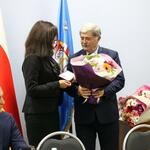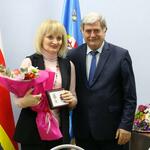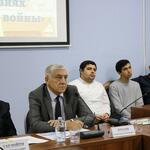The international scientific and practical conference “The Image of Russia and South Ossetia in the Information War” was held at the South Ossetian State University with the participation of Prime Minister Eric Pukhaev, Russian Ambassador to South Ossetia Marat Kulakhmetov, Russian and South Ossetian scientists, heads of relevant ministries , representatives of the Donetsk People's Republic, North Ossetia, Moscow, etc.
At the event, representatives of the North Ossetian State University, delegates from the Donetsk People's Republic, professor at MGIMO, vice-president of the International Eurasian Academy of Television, Radio and Press Mazheika Kipras-Stasis-Aras Iozovich were awarded anniversary medals of the Republic. The awards on behalf of President Anatoly Bibilov were presented by Prime Minister Eric Pukhaev.
According to rector of the South -Ossetian State University Vadim Tedeev, the theme of the conference is quite relevant in modern realities.
“The history of our Republic is long-suffering, it is the terrible 20s, 90s and subsequent years, when people of South Ossetia were on the verge of total annihilation,” said the rector. - And thanks to the Russian Federation, our brothers from North Ossetia, the peoples of the North Caucasus, who stood next to us, we were able to defend our Republic, repel enemy aggression, and thus the war ended, but unfortunately, the information war, declared to us, did not end. To counter it, concrete steps are being taken in Russia and South Ossetia, and this work must be continued so that the information war would not end, but would pass into a more relaxed phase.”
The 2020 Genocide
In his report “The genocide of South Ossetians of 1920 and the media”, Konstantin Pukhaev, Candidate of History, State Adviser to the President, has noted that in the coming year the Republic’s public will celebrate the centenary of the genocide of the Ossetians, committed by the government of the Georgian Democratic Republic in June 1920.
“As part of the preparations for the centennial of the Ossetian people, by decree of the President of South Ossetia, a special commission was set up to memorialize the victims of the genocide. It has developed a detailed program of events dedicated to this tragic date. The Parliament is also actively working in a given direction, with the involvement of experts, a legally substantiated document is being prepared by the expert community, proving the indisputability of the South Ossetian genocide that took place in 1920,” the historian emphasized.
The work of media representatives in August 2008
Konstantin Pukhaev also touched upon the topic of the Georgian aggression in 2008 in his report.
“Today, analyzing the events of August 2008, I am more and more convinced that if Russia recognized the Republic of South Ossetia on August 26, then Arkady Mamontov, Alexander Sladkov, Anton Stepanenko, Ruslan Gusarov and a number of other Russian journalists play an important role in this fact,” emphasized. the historian. “It was they who first-hand, often risking their lives, in combat reported directly from the line of fire obtained true information.”
The historian also spoke about the active work of the State Committee for Information and Press in August 2008.
“I remember the burning village of Khetagurovo, where I arrived on the evening of August 7, and where I found the film crew of the State Television and Radio Broadcasting Company“Ir ”at the head of the then Chairman of the State Committee for Information, Irina Gagloeva. Then, at midnight, with me, Inal Pliev transmitted the information from the burning Tskhinval to Bulgaria. I remember Andrei Kochiev, editor-in-chief of the newspaper Respublika, who flickered with his camera in various parts of Tskhinval,” said the Presidential Adviser.
Konstantin Pukhaev dwelled on other aspects of the state’s information policy.











